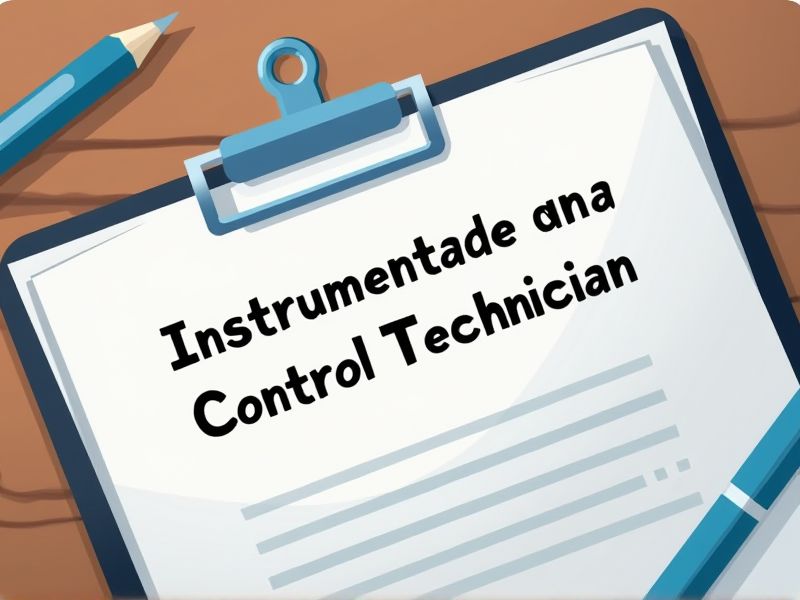
Instrumentation and control technicians work with complex systems that require precise calibration and maintenance to ensure safety and efficiency. Certifying organizations provide standardized training to enhance skill levels and reduce the risk of system failures. These certifications verify an individual's competency in handling critical tasks, adhering to industry regulations, and adapting to technological advancements. Important certifications for an Instrumentation and Control Technician can enhance career opportunities and validate their expertise.
ISA Certified Control Systems Technician (CCST)
Having a CCST certification ensures that the technician has a recognized standard of knowledge in instrumentation and control systems, enhancing their credibility. This certification often leads to higher job prospects and potential salary increase, as employers value validated skills. With increasing automation and complex control systems in industries, CCST-certified professionals are better equipped to manage and troubleshoot these systems efficiently. By maintaining this certification, technicians commit to ongoing professional development, keeping pace with technological advancements.
ISA Certified Automation Professional (CAP)
The ISA Certified Automation Professional (CAP) credential validates an individual's expertise and knowledge in control systems, enhancing employment prospects. By obtaining CAP certification, Instrumentation and Control Technicians demonstrate a comprehensive understanding of industry standards, fostering trust with employers and clients. CAP certification supports career advancement by aligning professionals with best practices and technological trends. Employers often require or prefer the CAP credential as it signifies a commitment to quality, safety, and efficiency in automation projects.
National Instruments Certified LabVIEW Developer (CLD)
A National Instruments Certified LabVIEW Developer (CLD) certification provides an instrumentation and control technician a structured understanding of LabVIEW, leading to improved system design and troubleshooting efficiency. Certified professionals often demonstrate enhanced skills in developing automated test and measurement systems, essential for modern instrumentation tasks. The CLD credential validates an individual's ability to effectively use LabVIEW for data acquisition, instrumentation control, and complex system integrations. When technicians hold this certification, organizations frequently observe a reduction in system downtime due to more proficient diagnostics and maintenance.
Rockwell Automation PLC Technician Certification
Obtaining the Rockwell Automation PLC Technician Certification enhances a technician's proficiency in programming and troubleshooting Programmable Logic Controllers, which are crucial for managing automated systems. Mastery of PLC technologies through certification can lead to increased job opportunities and career advancement in industrial automation sectors. Certification indicates a validated skill set, which can differentiate a technician from peers in the competitive job market. Employers often prefer certified technicians because they are seen as reducing downtime and ensuring efficient system operations.
Siemens Automation and Control Certification
Holding a Siemens Automation and Control Certification can enhance an Instrumentation and Control Technician's credibility and employability, given Siemens' reputation in the industry. Mastery of Siemens systems, a leader in automation technology, allows technicians to efficiently troubleshoot and maintain equipment, minimizing downtime. This certification ensures professionals are up-to-date on the latest technological advancements and system integrations. Companies often prefer certified technicians to ensure safety compliance and operational efficiency in automated processes.
HART Communication Protocol Certification
HART Communication Protocol Certification ensures that an Instrumentation and Control Technician is proficient in handling HART-enabled devices, which are prevalent in modern industrial settings. This certification verifies the technician's ability to perform essential tasks such as device configuration, diagnostics, and troubleshooting, which enhances system reliability and efficiency. Industries demand certified technicians to reduce the risk of errors in communication between devices, which can lead to costly downtime. Certification aligns technicians with industry standards, thereby increasing their employability and potential for career advancement.
OSHA 10-Hour Safety Certification
Instrumentation and Control Technicians often work in environments that involve complex systems and hazardous machinery, making OSHA 10-Hour Safety Certification crucial to ensure they understand and adhere to safety protocols. The certification provides knowledge on identifying workplace hazards, reducing the risk of accidents and injuries. Understanding OSHA standards helps technicians comply with regulations, avoiding legal repercussions and costly fines for their employers. Proper safety training can enhance workplace productivity by reducing downtime associated with accidents and fostering a safety-first culture.
Six Sigma Green Belt Certification
The Six Sigma Green Belt Certification equips Instrumentation and Control Technicians with skills to systematically reduce process defects, enhancing efficiency and reliability in their work. This certification fosters a data-driven, analytical approach, enabling technicians to identify and address potential issues before they escalate into bigger problems. Through this training, technicians can contribute to cost reduction by streamlining processes, which is crucial for operational sustainability. The certification also enhances career prospects, as employers increasingly value professionals who can apply Six Sigma methodologies to improve industrial processes.
API 510 Pressure Vessel Inspector Certification
Certified API 510 Pressure Vessel Inspectors possess specialized knowledge crucial for assessing the integrity of pressure vessels, which Instrumentation and Control Technicians may need to ensure reliable and accurate readings from instruments attached to or associated with these vessels. With this certification, technicians better understand potential pressure-related issues that could affect instrumentation performance, boosting safety and efficiency in plant operations. Pressure vessel integrity is directly linked to operational safety; thus, having insights from API 510 certified technicians can mitigate risks related to instrumentation failures. Knowledge gained through certification aligns instrumentation activities with regulatory standards, ensuring compliance and avoiding costly penalties.
Certified Maintenance & Reliability Technician (CMRT)
Certified Maintenance & Reliability Technician (CMRT) is needed for instrumentation and control technicians as it validates the technician's ability to maintain and improve system reliability. With CMRT credentials, technicians demonstrate proficiency in employing best practices, which reduces equipment downtime and operational costs. This certification assures employers of the technician's commitment to adhering to industry standards and continuous improvement. Enhanced skills lead to more efficient troubleshooting and maintenance, directly impacting plant performance and safety.
Summary
With certifications, you enhance your technical skills and knowledge, making you more competitive in the job market. These credentials can lead to increased job opportunities and security, given that employers often prefer certified technicians. Certification can also result in higher earning potential as it signifies proficiency and dedication to your field. Overall, your professional credibility and career advancement prospects are significantly improved.
